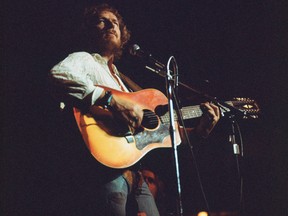Colby Cosh: Gordon Lightfoot — the high peak of Canadian folk music
He adhered to Canada in a way that never invited questions or attention — and we all recognize him as being among the most Canadian singer-songwriters

Article content
I don’t know if you’ve had this thought … there’s a sort of self-organizing Mount Rushmore of Canadian folksingers that bears giant heads of Neil Young, Leonard Cohen, Joni Mitchell and Gordon Lightfoot, who died Monday at 84. We could probably agree that these people are a category unto themselves (realizing that we might owe apologies to more idiosyncratic national heroes like Stan Rogers, Stompin’ Tom Connors and Buffy Sainte-Marie). They belong to a common genius-with-an-acoustic guitar tradition; and they are all peers of Bob Dylan, the quasi-Canadian central figure of their generation who unlocked an indefinable creative secret so powerful that it seems to have projected some kind of wave that washed over the continent and splashed over the Canadian Shield.
These people are a big part of our claim to notice in the history of civilization, and it’s not a coincidence that three of them turned a little weird. The folksingers of the 1960s all faced the challenge that Dylan first tackled — namely, when and where and how to betray folk-music performance dogmas. Neil Young, for whom the adjective “protean” might have been invented, went electric and then electronic with a vengeance (being a garage tinkerer by nature) but occasionally wandered back to the bag of harmonicas. Cohen, a poetic prodigy whose very relationship with music was enigmatic, turned Buddhist and went up a mountain but kept making spare, haunting records. Joni Mitchell became the dotty jazz-loving aunt we all worry about a little.
But Gord — stolid, fame-averse Gord — just kinda kept on truckin’ with guitar and voice and a handful of chords he never tired of combining in arresting, uncanny ways. Along the way he became one of the most prolific pure hitmakers on earth. If you are a Canadian in the neighbourhood of 50 years old, Gordon Lightfoot was part of the furniture you grew up amongst. As far as the radio was concerned, there was no possibility of refuge from Gord. From 1970 to 1978 or thereabouts, he usually had at least a minor pop hit going, but he fit in comfortably on the country stations (Marty Robbins having taken “Ribbon of Darkness” to number 1 in 1965) whose managers might have retched at the thought of playing a Dylan number. And brainy FM, campus and community stations always liked to have something longform to accommodate coffee and bathroom breaks, so you could always count on hearing “Railroad Trilogy” or “Edmund Fitzgerald” if you waited long enough.
He took the simplicity and universality of folk music absolutely as far as it could go commercially, subsiding gradually into a curious but comfortable obscurity. He was probably pretty wealthy from “Ribbon of Darkness” onward, but having disastrous relationships with women, hitting the bottle and oozing picturesque, gentle songs from the resulting wounds was his way of being, not some conscious scheme for success. He could never at any point be suspected of wanting to be a rock star per se, even though everybody wants to be a rock star. Maybe there’s some sonic artifact that shows what it would sound like for Gordon Lightfoot to “rock out,” but I can’t imagine what the heck that might sound like.
He adhered to Canada, of course, in a way that never invited questions or attention — and we all recognize him as being among the most Canadian of singer-songwriters even if we prefer the unpredictable Young or the boulevardier Cohen. He’s the only person on our folk Rushmore who didn’t quit the country, the only one who had a relatively uncomplicated and concrete attachment to it. I’ve barely budged from my desk in Alberta for a few years, but even I have been getting reports of neighbourhood Gord sightings from Toronto ever since David Akin tried to do away with him in 2010. I find unexpectedly that I will miss that periodic reassurance: no more will I be reminded that the world, and my country, still includes such an elemental, fertile, naturally gifted creator.
National Post
Twitter.com/colbycosh
This column was originally published in the NP Platformed newsletter. Sign up here.













Postmedia is committed to maintaining a lively but civil forum for discussion. Please keep comments relevant and respectful. Comments may take up to an hour to appear on the site. You will receive an email if there is a reply to your comment, an update to a thread you follow or if a user you follow comments. Visit our Community Guidelines for more information.